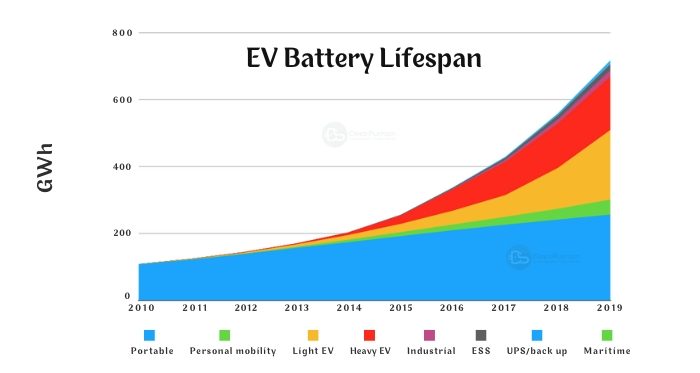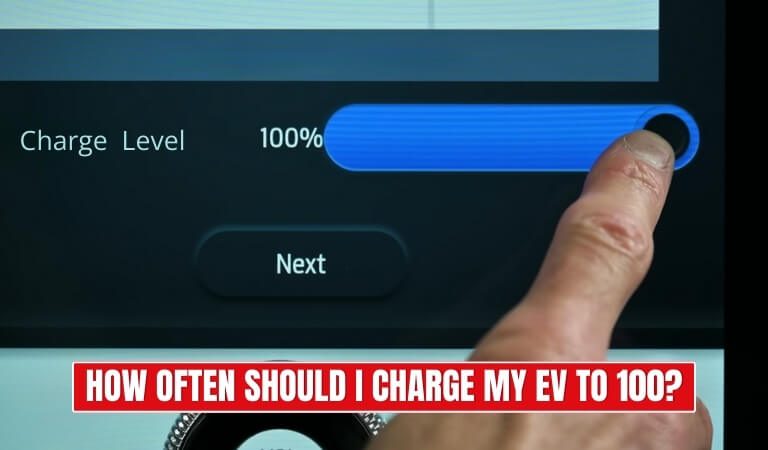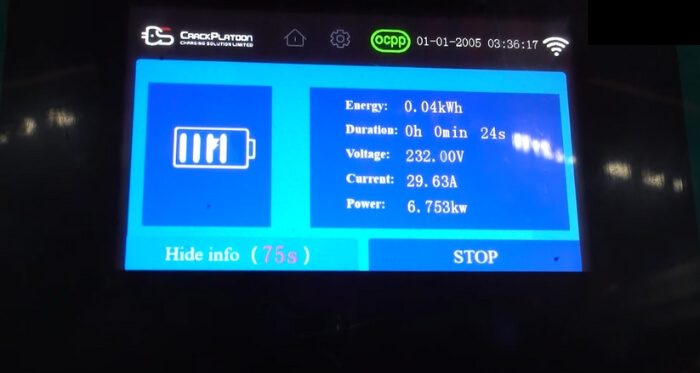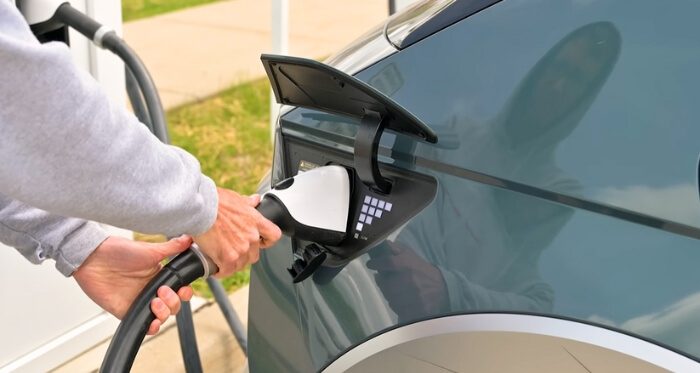EVs are superior innovations in the automotive industry that reduce fuel use and carbon production. The benefits of EVs are undeniable, but many questions often arise regarding charging schedules, battery health, and many more, as not all EVs have the same type of battery. Among the countless inquiries, a crucial question stands out: How often should I charge my EV to 100%?
The necessity of charging an EV depends on the battery percentage. If the battery percentage is below 20%, the car needs to be fully recharged. Otherwise, frequent 100% charges are not recommended if the battery is above 80%, as charging has an impact on the battery.
However, understanding the EV battery management system, battery types, and factors to consider before fully recharging can help increase the longevity of the EV battery. Moreover, a powerful EV charging station is also required, like CrackPlatoon for fast charging with a suitable rated power.
What Are Electric Vehicle Batteries?
Electric vehicles are powered by advanced lithium-ion batteries, a technology that has revolutionized the automotive industry. These batteries offer high energy density and efficiency which is perfect for EV manufacturers. Understanding how these batteries function is crucial to comprehending the impact of charging practices on their overall lifespan.
Factors Influencing EV Battery Lifespan
In general, no battery in the world has a long-lasting life. Each charge degrades the battery a bit, even though it works the same for the lithium-ion battery. Here are some factors that are related to the lifespan of a battery:

Depth of Discharge (DoD)
Lithium-ion batteries are the powerhouses for driving electric vehicles that demonstrate a sensitive response to the depth of discharge (DoD). DoD signifies the degree to which a battery is utilized and depleted during its operational use before undergoing a recharge.
Contrary to popular belief, lithium-ion batteries endure fewer stress cycles when they experience shallower discharges. This means that consistently avoiding deep discharges and opting for partial discharges can significantly help extend the overall lifespan of the EV’s battery.
Temperature Considerations
Another critical factor influencing the longevity of lithium-ion batteries is temperature. These batteries operate optimally within a specific temperature range, and differences from this range can lead to accelerated degradation.
Extreme heat or cold can compromise battery performance and contribute to a reduction in overall capacity over time. Electric vehicles are equipped with sophisticated thermal management systems designed to regulate battery temperature, ensuring that they stay within the ideal range for efficient and long-lasting operation.
Charging Frequency
The frequency at which an electric vehicle is charged also plays a pivotal role in determining battery lifespan. Lithium-ion batteries are designed to tolerate a limited number of charge periods, and each charging cycle contributes to gradual degradation. Striking the right balance between regular charging and avoiding unnecessary cycles is crucial.
While frequent charging is generally well-tolerated, consistently charging to 100% and allowing the battery to regularly deplete to very low levels can accelerate wear and tear. Therefore, adopting a charging routine that aligns with the vehicle’s intended usage patterns can significantly impact the overall health of the battery.
How Often Should I Charge My EV to 100?
The confusing question arrives now: How Often Should I Charge My EV to 100?
The answer mainly depends on an individual’s EV’s battery quality and capacity. Because charging the EV to 100% is a practice that should be approached with consideration for battery health.

Do not frequently charge EVs to 100%, as it will ultimately lead to battery degradation. In daily use and routine commuting, it’s mostly recommended to charge the EV within the range of 20% to 80% to the extent needed for owners’ typical daily driving. Maintaining the battery within this range is optimal for preserving its health and maximizing its lifespan.
However, there are instances when charging 100% is advisable, such as before going on a long trip or when someone anticipates needing the maximum possible range for a specific occasion.
Frequent charging to 100% and keeping the battery in high states of charge for extended periods may contribute to battery wear, so it’s essential to refer to the vehicle’s manual and follow the manufacturer’s recommendations for charging practices. Utilizing features like charge scheduling and setting target charge percentages can help strike a balance between maximizing range and ensuring the longevity of your EV’s battery.
In addition, always ensure to check the factors that can influence the battery’s lifespan. With better EV charging practices, individuals can increase battery life.
Factors to Consider When Charging to 100%
Several factors should be considered when deciding to charge the EV battery to 100%. These factors are crucial for maintaining optimal battery health and maximizing the lifespan of your EV:

Battery Longevity
Charging an EV to 100% frequently may accelerate battery degradation over time. Lithium-ion batteries tend to wear out more quickly when regularly charged to their maximum capacity.
Daily Driving Needs
Evaluate one’s daily driving needs to determine if charging to 100% is necessary. For routine commuting within the vehicle’s daily range, a lower state of charge (SOC) may be sufficient and can contribute to longer battery life.
Manufacturer Recommendations
Follow the vehicle’s manual for specific recommendations from the manufacturer regarding charging practices. Manufacturers often provide guidance on the ideal SOC range for regular use and may suggest occasional 100% charges for battery management.
Charge Balancing
Some EVs perform a balancing operation when charged to 100%. This process helps ensure that all cells in the battery pack are charged evenly, which is essential for optimal performance. Consider checking the vehicle manual for information on this feature.
Long Trips and Special Occasions
Charging to 100% is advisable when planning long trips or on occasions when you need the maximum available range. This ensures the vehicle has sufficient battery capacity to reach the destination without anxiety about running out of charge.
Charge Scheduling
Take advantage of charge-scheduling features if the EV supports them. These features allow the user to set specific times for charging, enabling them to avoid unnecessary 100% charges for daily driving. CrackPlatoon EV charging stations are the finest in Bangladesh because the user can set a schedule for charging, and most of the stations consume less energy.
Environmental Conditions
All hot and cold extreme temperatures can affect battery performance. Charging to 100% in very high or very low temperatures may put additional stress on the battery. Consider the climate in a specific region when deciding on the charging routine.
Range Flexibility
Determining the need for range flexibility is a must on a daily basis. If your daily driving falls well within the vehicle’s range, charging a lower percentage may be more than sufficient.
While charging to 100% is necessary in specific situations, it’s essential to keep a balance between maximizing range and preserving battery health. Consider these factors in the cycle with driving habits and manufacturer guidelines to make informed decisions about when to charge an EV to its full capacity.
How To Prolong EV Battery Life?
Prolonging the battery life of an EV is crucial for maximizing its performance and longevity. Several practices can help maintain the health of the EV battery over time.

Avoid Regular Full Charges
Charging an EV battery to 100% on a regular basis can help with accelerated wear. In contrast, aim to keep the battery within the recommended state of charge range, typically between 20% and 80%, for everyday use.
Appropriate Charging Habits
Every EV user should have an appropriate charging habit. If anyone’s daily driving needs fall within the electric range of their EV, it is recommended to avoid unnecessary charging sessions. Charge only when needed, rather than routinely topping up the battery.
Avoid High-Power Fast Charging
DC Fast charging is convenient for occasional use, but relying on high-power chargers regularly can put additional stress on the battery. Whenever possible, use slower charging methods to reduce heat buildup.
Regular Software Updates
Keep the EV’s software up-to-date. Manufacturers often release updates that optimize battery management systems, improving overall efficiency and performance.
Stay Informed
Another good way to prolong the EV battery is by always staying instructed about advancements in EV battery technology and updates from the manufacturer. As technology evolves, new practices may appear to enhance battery life and performance.
Final Thoughts
Not all EV drivers have the ideal knowledge of their charging schedules. Some often ask, How Often Should I Charge My EV to 100? EVs are different from ordinary cars and always require having an adequate charge to drive them. Although it’s an electric-powered car, that doesn’t mean we often charge it to the maximum percentage.
Charged electric devices naturally degrade the battery, and in the case of EVs, the degradation is even greater. That’s why it is advisable not to charge the EV if its battery state is already around 20% to 80%, unless in an emergency or on a long trip. Every EV manufacturer has specific user manuals for their cars, so it is also advisable to follow those.
For convenient EV charging, consider going to a reliable EV Charging Station in Bangladesh like CracPlatoon for an optimal charging experience. All their EV Chargers offer high-quality features and are designed to enhance the battery and vehicle performance.
